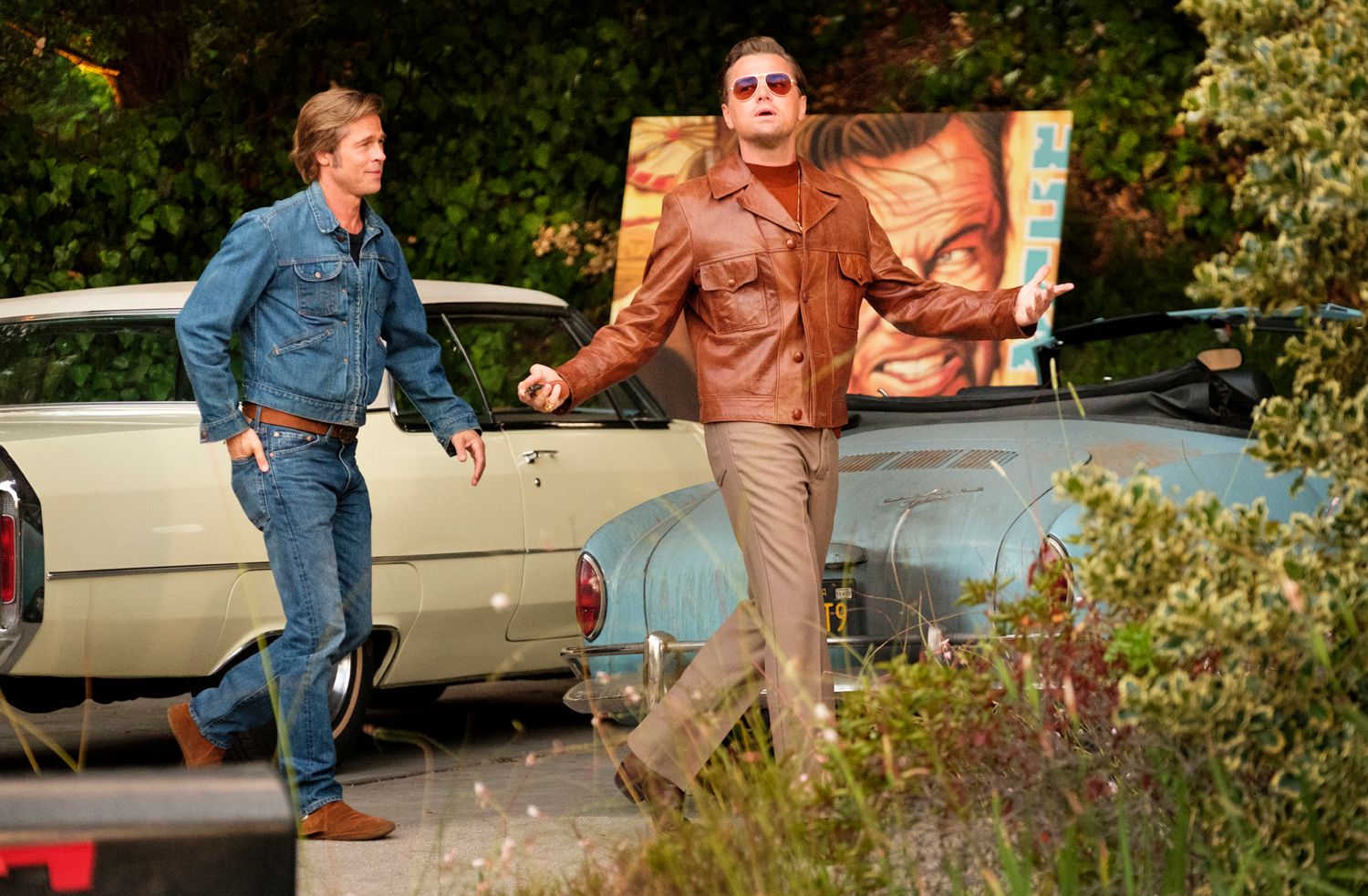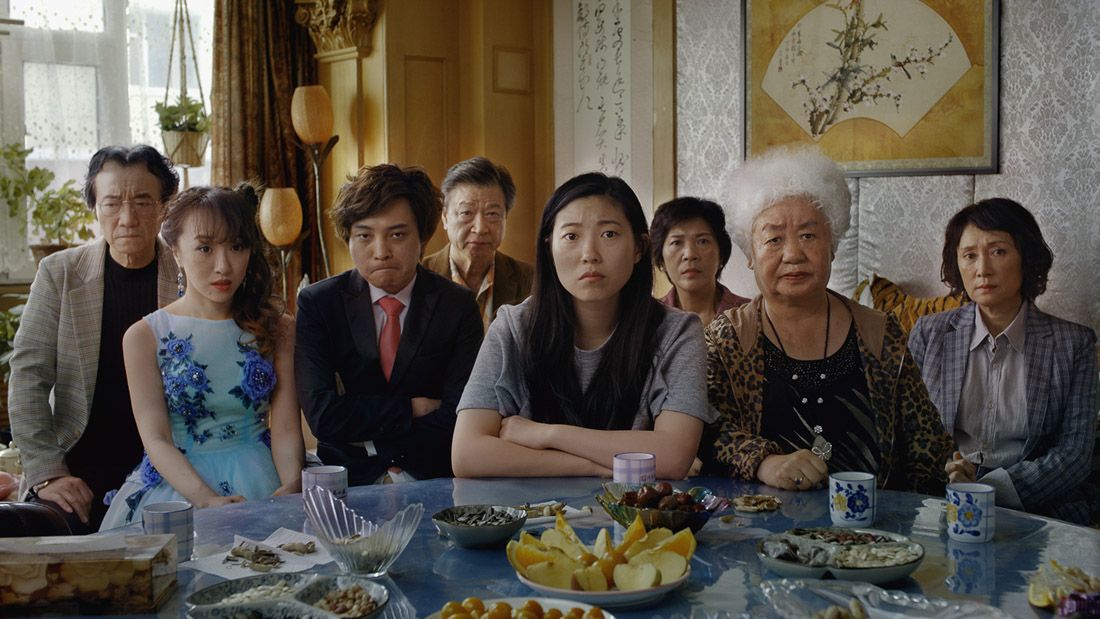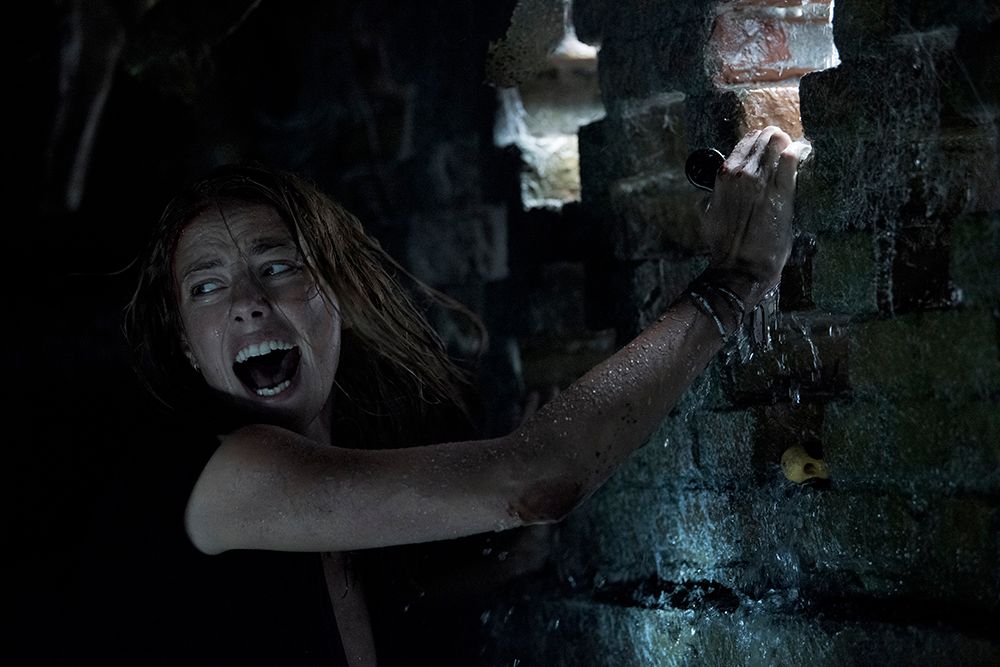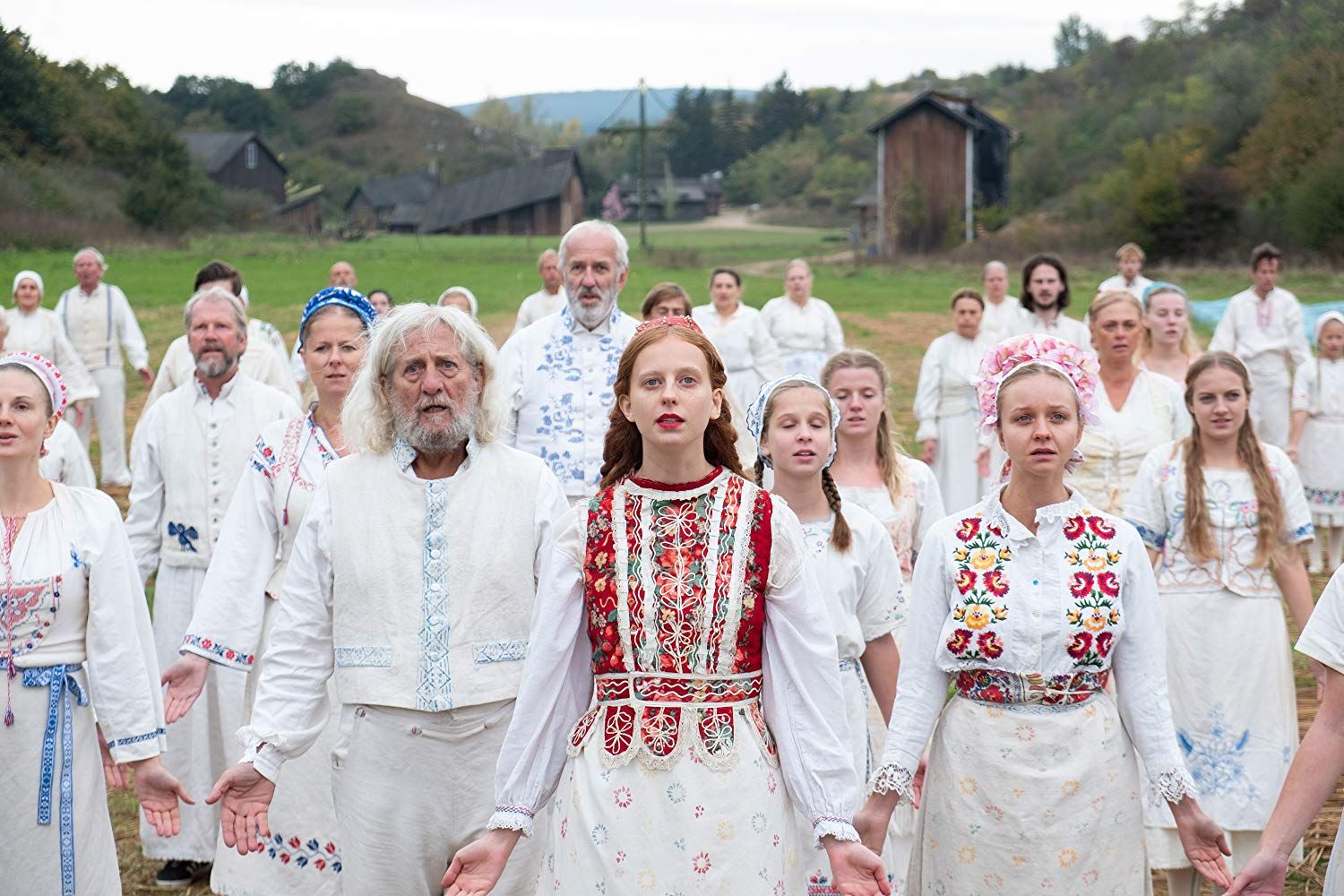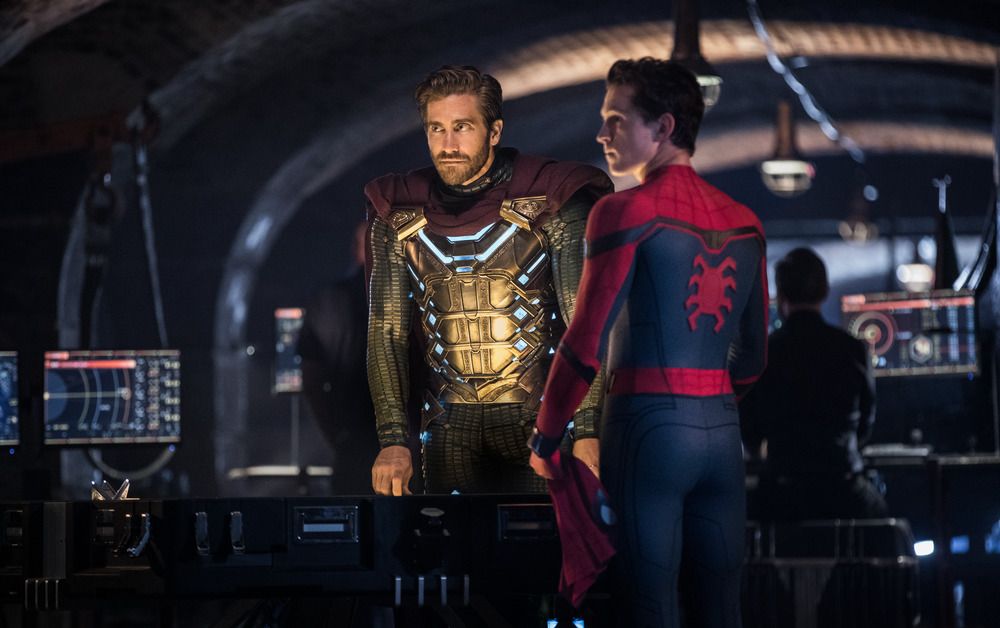It’s the dead end he’s contemplating here, simultaneously eulogizing and criticizing ways of life that were rapidly aging, and luxuriating in reviving the period detail his crew carefully recreates. The two men at the center are often pathetic figures of curdled cool — flubbing lines or ruining opportunities on set, wallowing in self-pity, shrugging off bad behavior — with flashes of their potential charms, never more than when behind the wheel of a roaring cool car zipping down the streets of Hollywood. They cycle through bemused or prickly encounters with a large, memorable ensemble of one- or two-scene wonders (Al Pacino! Kurt Russell! Dakota Fanning! Timothy Olyphant! Many more!) as one or the other hangs around a Western set full of cast and crew or an old Movie Ranch full of cultists. It's by turns silly, sad, and somewhere between. This movie carries itself with a relaxed confidence, most beguilingly wearing its heaviness lightly and its lightness heavily. Meanwhile Tate floats through her brief sequences interspersed as a bittersweet specter of a possible future, glowing happily, gazing at herself on the movie screen with delight and, later, cradling her pregnant belly. The movie — overall low-key amused, drunk on movie lore love, and loaded with scratchy needle drops, booming car radios, the soft hum of tube TVs, and the click-clatter of a projector whirring to life — carries with it this ambiguous sadness. No matter the outcome, this whole way of showbiz is on the way out, a freewheeling turbulent decade dying and, so, too, eventually, the analogue pleasures will grow fleeting and fade. Fittingly, it’s a movie of big small pleasures, fleeting, fading.
Friday, July 26, 2019
What Has Been: ONCE UPON A TIME...IN HOLLYWOOD
Quentin Tarantino’s Once Upon a Time...in Hollywood is a conjoined pair of rambling character sketches with a layer of true crime dread for a counterpoint, then oodles of his relaxed nostalgia and affectionate irony slathered on top. No one can construct a scene like him, overflowing with crackling dialogue and with every personality instantly memorable. Then there’s the cinephile, nearly scopophilic, pleasure of the way his films look and feel, with the camera’s long smooth moves on cranes and tracks, always in the right place, and the crisp, smooth flavor of the edits at unexpectedly apropos times. This one unfolds and unfolds and unfolds, incident following incident and who really knows where this interesting thing’s going. Only the true life historical references hint at a likely gruesome end. It’s 1969 in Los Angeles. We follow a melancholic, alcoholic has-been actor (Leonardo DiCaprio), once a TV cowboy lead who could’ve been a movie star, but has ended up in the last dregs of a dying studio system going paycheck to paycheck as a villain-of-the-week on any show that’ll have him. Between jobs he drinks with his old buddy and stunt double (Brad Pitt), who’s also his driver, handyman, and sometimes roommate. Next door is a new neighbor, and a reminder that showbiz stardom is always pulling in and elevating someone younger while pushing aside old news stars who can’t make it. She’s new It Girl Sharon Tate (Margot Robbie), flush with new success. The name Tate will make anyone familiar with her eventual murder know this loose construction of scenes set in the twilight of a rapidly curdling Sixties is on its way to a dead end. Knowing, too, that Tarantino is known for staging spectacular suspense and violence, and has a penchant for going the extra ahistorical mile — like blowing off Hitler’s head in Inglorious Basterds or staging a one-man slave rebellion in Django Unchained — there’s an added suspense in wondering how far he’ll take his depiction.
Sunday, July 21, 2019
Everytime You Go Away: THE FAREWELL
Writer-director Lulu Wang’s semi-autobiographical feature The Farewell is a deeply moving work of tenderness and insight. It’s about a grandmother (Shuzhen Zhou) with a fatal diagnosis — lung cancer, advanced, survivable for only months — and a family that loves her so much they won’t tell her the real test results. (“Benign shadows” her sister (Hong Lu) will comfortingly say instead.) In fact, they’ll have a cousin (Han Chen) and his girlfriend of three months (Aoi Mizuhara) rush things along in order to throw a wedding, simply to give everyone a chance to see Nai Nai one last time. This gives the film a rich layer of dramatic irony over every scene, enhanced by cultural specificity. Our main character, struggling young author Billi (Awkwafina), is the old woman’s beloved granddaughter, a Chinese-American who sees in this sad news another connection to her homeland disappearing. She moved to New York at a young age, with her parents (Tzi Ma and Diana Lin) attempting to start fresh with new opportunities. They haven’t forsaken China; they’ve merely moved, like Nai Nai’s other son (Yongbo Jiang), who brought his family to Japan years ago to pursue his line of work. (What fascinating immigrant stories, playing out matter-of-factly as an ongoing background context.) Thus the warm, loving, kindly opinionated old woman beams to have her family all together around her table — the first time in 25 years she marvels. In warm and prickly sequences of family togetherness, old memories are shared, old conflicts are gingerly prodded, and traditions are revived with great pathos and care. Everyone’s connecting — Wang gives us intimate Demme-esque head-on shots, the better to feel the warmth of a grandmother’s smile, the charm of an auntie’s matter-of-fact revelation, the compassion of a granddaughter’s yearning — as emotions rush in and are tamped down, only to bubble up in English so Nai Nai won’t understand, or later in hotel room tears.
The movie is a direct, pure expression of a family in slow-motion unspoken crisis embracing their opportunity to spend time together. They're trying to carefully say their goodbyes, every nugget of wisdom suddenly precious, every hug held a little tighter and longer than usual. There’s love and sadness all around, a sense of time passing that must be held on to while they can manage it. Wang’s writing is sharp and sensitive, never betraying the characters with false conflict or forced sentimentality. She frames scenes to allow honest interactions that build and ramble like a real family’s hangouts would, and finds scenarios to draw out gentle humor and casual wisdom. It’s a film that feels lived-in, beautifully acted in every role, carefully composed to highlight the lead’s discomfort and displacement while taking great comfort in the grandmotherly presence that anchors and fills every scene. It’s the opposite of classic generational dramas like Leo McCarey’s Make Way for Tomorrow or Yasujiro Ozu’s Tokyo Story, in which the elderly are slowly marginalized. Here Nai Nai is the center of attention, in a film gently perched on the fragility of someone so beloved. The family loves her too much to admit to say goodbyes, even though it’s inevitable. How lucky they are to have her, and how loved she must feel to have them there, even when it’ll be bittersweet to see them leave. The movie has that same sweetly overwhelming power to linger in this irreconcilable need to appreciate love and then let go.
Friday, July 19, 2019
Circle of Strife: THE LION KING
Let me take the optimistic long view: Jon Favreau’s The Lion King should rightly be, years if not months hence, a forgotten curio lost in the sands of time. The latest, and easily the least, of Disney’s current remake cycle, it makes most depressingly literal the fact they’ve traded these mega-budget behemoths for the out-of-the-vault theatrical rereleases of yore. The filmmakers hired, excellent craftspeople, have been tasked with merely transcribing the 1994 original — beat for beat, often note for note, sometimes shot for shot — re-animating the pseudo-Shakespearean jungle conflict between an exiled lion cub prince and his murderous uncle in a computer-generated photoreal style that removes its charms, its imagination, its warmth, and its power. I feel a great pity for children who see this before (or, heaven forbid, instead) of the original, for they have been robbed of a genuine experience with a work of real creativity and energy. Instead, they will have seen a dreary, and worthlessly pedestrian remake that mistakes realism for visual interest, and brings only dirt-brown recreation where once was color and life and style. That Disney would plunder its classics for profit is one thing; some of these remakes have been good, and even the ones that aren’t have been interesting attempts. Here, though, they’ve heisted the magic entirely out of one of their greatest accomplishments, leaving only a deadening emptiness behind. Even when, from time to time, I didn’t mind sitting in the theater with it, I found myself wishing to go home and watch the real one.
Misconceived from frame one, the filmmakers are putting great effort after an unwinnable position. To the extent that it nonetheless finds sequences that work, it’s because they’ve taken them wholesale from the original — timing, composition, score, line readings. (Its best images, too, are copied directly — a cub’s little paw in his father’s literal footstep; clouds parting with ghostly splendor, a cleansing rain to wash away the prideland’s scars.) Yet there they feel fossilized, overdetermined, programmatic, lifeless, overfamiliar. When it strays from the original it’s somehow worse: replacing buoyancy with leadenness, caricature with zoology, a sparkle of life in clean hand-drawn lines with CG taxidermy. The lion’s share of the problem comes down to the inexpressiveness of the realistic creatures, which should have given rise to a Kuleshov effect-led reimagining of the visual language, but instead, leaning on the first film’s editing as storyboards for this one, it deadens every reaction shot. Try as they might to avoid the uncanny valley, hewing close to a Disney Nature style deemphasizing mushy mumbling animal mouths whenever possible, it makes the occasional cartoonier quips, references, and flatulence stick out uncomfortably, and gives all emoting over to the Pavlovian effect the songs and lines will spark in those of us familiar with the original. So much effort has gone to produce so little. Even the perfect casting (Donald Glover! Chiwetel Ejiofor! Beyoncé! Alfre Woodard! Seth Rogen! Billy Eichner! James Earl Jones again!) goes to waste in this flavorless, passionless, redo that constrains their personalities. The sooner forgotten the better, unless someone wants to go all the way back and get this excellent ensemble to work on Hamlet itself. Now that’s a reimagining I’d like to see.
Friday, July 12, 2019
Gator Raid: CRAWL
Crawl is a tight, smartly constructed creature feature. Running a trim 87 minutes, it gets its premise set up fast, the better to spend most of the time milking every last jolt out of it. In short order, Michael and Shawn Rasmussen's tidy screenplay places a Floridian collegiate swimmer (Kaya Scodelario) and her handyman dad (Barry Pepper) in the crawlspace of the old family home with a hurricane howling towards them and an alligator slithering down the stairs. They’re doubly trapped, water rising and gator stalking. The entire narrative thrust of the film is hoping the pair will make it out alive. There's some attention paid to the father-daughter dynamic and their prickly estrangement, but it takes an obvious background place behind their immediate dangers. That the house rapidly getting swallowed up by the angry waters is on the market as a result of the dad's contentious divorce is a fine character detail dovetailing with the plot, seeing as the characters will have to escape not just the building, but these bad feelings in order to reconcile. Nevertheless, it's almost exclusively about the predicament involving the gator threatening to gobble them up.
The movie is compelling and entertaining, with fine physical distress and desperation played out in close quarters and sweaty closeups. The story is shaped to exploit every best option they have for escape. Given that one’s an expert swimmer and the other has a fully-stocked tool belt, they’re better equipped than most. We watch as they pick a plan, then follow it as far as they can until — WHAM! — that option, too, is closed off. Back to square one. Find the next best way out. Try again. It’s a procedural one-thing-after-another thriller that builds and builds with a fun sense of “ugh, what now!?” around every corner. The gator’s presence is convincing. Its gory chomps (the only reason the movie is R) are considerable — a Best Makeup contender, if you ask me. The harrowing sound design is all eerie splashes and a constant backbeat of howling, pounding winds and rain. And the jump scares and swimming tension are expertly doled out. Director Alexandre Aja, who may never elevate material (give him a junk screenplay like Piranha 3D and you’ll get a junk movie), but who is a perfectly competent realizer of movies, does his best work here. He’s manipulating tension and surprise, often keeping the focus on his actors' wide-eyed expressions of panicked thought, and maintaining visual interest in a contained environment. All involved make the simple premise last just long enough to satisfy. It’s exactly what it promises on the tin.
Thursday, July 4, 2019
MIDSOMMARtime Sadness
Ari Aster is the latest new horror auteur du jour. He’s now written and directed two films of excellent formal control—slowly moving the camera, manipulating soft rustling rumbling half-heard sound, and staging grotesque action to precisely modulate a sort of austere art house unease. He gets the craftspeople working well together at the tops of their games. He populates his films with expertly directed casts of phenomenal thespians howling in anguish when they’re not stupefied or lobotomized by grief. These films have passages that are quite good, but are awfully vacant in the end, having moved on autopilot through standard horror tropes without much else deeper to consider. Sure, they’re slower and more artful than the swifter schlockmeisters would serve up. They summon dread like no one’s business. They ask you to descend with the characters in unsettling situations, but I find myself asking, head down for what?
Take his debut film, Hereditary, for example. It features a galvanic performance from Toni Collette. Playing an anxious, depressed woman in the troubled wake of her difficult mother’s death, she’s so palpably troubled her skin seems to hurt. As the film’s nasty shocks get gnarlier and creepier, she grows vividly agitated, a supremely uncomfortable unraveling all the more unnerving for seeming so real as the supernatural threat around her grows dark and deep. Unfortunately the creeping sense underneath these happenings is not primarily one of sick dread, but of gradual mundane predictability. (A brutal roadside shock early in the picture is the peak of its surprise, as things going bump in the night take on a pedestrian and dull been-there-done-that occultist mishegoss.) It slowly drains the gusto out from under its lead tour de force. One of the most impressive live wire performances in recent memory (my Best Actress in any awards that’d have me as a voter last year) is stranded in a movie giving up its promise minute by minute, sequence by sequence. It's gripping craft chasing down an increasingly unproductive concept.
I was glad to see Aster’s follow-up, Midsommar, is a slight improvement. Although now between the two films we can make a short dreary list of things this writer-director finds scary — cult rituals, heads falling off, family members brutally dying, naked old people — and uses as predictably self-evident, his sophomore effort does slightly more to envelop its characters in their derivative horror plot as it imposes its dark metaphor upon them while pretending it's insightful. It’s a college-students-on-a-camping-trip movie, this time a group of grad students off with a pal to visit his tiny Swedish hometown commune. A spectacular feat of precisely photographed production design, it's a memorable, sinister wide-open clearing with cabins and crops and ominous symbols. Under the intense summer sun, the peculiar rituals of this insular community take on a procedural logic of psychedelic menace, the hallucinogenic tea causing the forest landscape to pulse and warp, the cheery threat of unfamiliar tradition ladling fatal openness on top of garden variety awkwardness. The crux is that the lead (Florence Pugh) is mourning an unspeakably upsetting family tragedy, and her boyfriend (Jack Reynor) is an inconsistent support system. And so maybe these cultists — with their cooperation and hard work and dance competitions, and ritual suicide, and odd breeding habits — have figured out a way to support each other? She’s tempted, but it never quite syncs up in the way the movie expects it to, losing track of her perspective and making a few leaps by the end to force its conclusion for her. Wondering why, exactly, she allows herself to trust these people after her hugely traumatic opening family trouble, and again after initial distressing suspicions, makes the finale so very hollow. But the way there is often transporting, scene after scene of slow, straight-faced setup and baggy horror tropes (Will Poulter’s surly, sarcastic tagalong is terrific comic relief of a sort that could be airlifted into a Friday the 13th) and anthropological interest (the cult’s every ceremony goes on and on). Eventually side characters disappear without satisfying payoffs, violence gets increasingly gnarly, and we’re left with our lead couple’s falling out going up in flames. Ultimately just Hostel for people who prefer some slow-drip art house sheen to the blood and guts, it never quite activates its considerable potential, but the journey there is certainly well-crafted unease with fantastic performances. Aster might have a great film in him yet.
Wednesday, July 3, 2019
Eurotrip: SPIDER-MAN: FAR FROM HOME
Spider-Man: Far From Home is a Marvel Cinematic Universe product. It’s a testament to their quality control that the designation alone tells you exactly what you’re going to get. They all have charming casts, light tones, quipping dialogue, and hammering CG lightshows for action sequences. It’s all very hectic and bouncy, and even when all hope is lost, it’s never really gone. Even Endgame, which maybe broke the timeline bending over backwards to pretend these things have genuine emotional consequences, couldn’t keep Infinity War’s poker face for more than twenty minutes or so. All this is to say: the latest Spidey has lower highs and higher lows than its non-MCU predecessors. (For better or worse, we'll not soon have a Spider-Man as pure and strong as Raimi's, or as angular and messy as Webb's.) Tom Holland remains a spunky, boyish Peter Parker, this time abroad with his classmates on a European field trip. The ensemble of teens is an agreeable bunch, especially Zendaya whose low-key cool affect and compelling screen presence is the least showy and yet acts circles around the rest. (I suppose it says more about my level of maturity than the film’s that I found their teachers — capably, earnestly frazzled comedic relief from Martin Starr and JB Smoove — the most sympathetic characters and my rooting interest.) Predictably, superhero dilemmas follow the trip at every stop as the mysterious new character, aptly named Mysterio (Jake Gyllenhaal, having fun, for what that’s worth), is fighting monsters and Nick Fury (Samuel L. Jackson cashing that check) thinks Spidey should help. It sets up the usual conflict between Peter’s normal teen life (where he just wants to finally kiss his crush) and the demands of a Spider-Man’s responsibilities. (And what a nightmare for those poor teachers! I can't even imagine...) It’s all in the unfortunate shadow of Iron Man, who looms large in the space Uncle Ben should have. But at least returning director Jon Watts and his script team dispatch with Endgame’s implications with all the seriousness they deserve — a hand wave and a wink. Because by now we know the MCU is a franchise of frivolous nothings. Sometimes they’re huge fun; sometimes they’re dull time-wasters. And by now you know if you’re into it or not. This one is neither the best nor the worst. It simply is good enough to not regret it in the moment, though quiz me on it in a month and I’m sure I’ll draw some blanks.
Subscribe to:
Posts (Atom)

